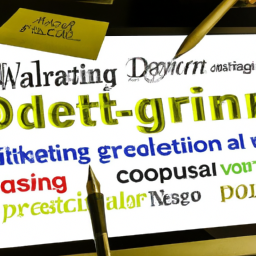How To Create An Author Website To Maximize Your Marketing Potential
Table of Contents []
- Creating An Author Website
- Creating An Author Website: An Enlightening Prelude
- Identifying Your Audience
- Domain & Hosting Basics
- Website Layout & Design
- Page Content
- Elements Of An Effective Homepage
- Brief Recap & Looking Ahead
Creating An Author Website
Creating An Author Website: An Enlightening Prelude
As an author, having a self-branded website remains one of the most effective marketing strategies for getting your work known by an ever-growing audience. But creating a website can seem like an overwhelming endeavor, especially if you are not comfortable with technology.
This article seeks to offer you with a comprehensive guide for creating an engaging and successful author website. We will break down the process into the following key elements: Identifying Your Audience, Domain and Hosting Basics, Website Layout and Design, Page Content, and Elements Of An Effective Homepage. We will also add a few relevant subheadings to help contextualize our main points.
Identifying Your Audience
The first step to creating your author website is to identify your target audience. Whether your work is geared towards Fiction, Nonfiction, Young Adults, or another niche, your website should be tailored to match your ideal audience's preferences & needs. It can also be helpful to gain an understanding of the sites that your target audience tends to use, so that you can tailor your website correctly.
Competing Blogs & Websites
Once you have identified your target audience, it is important to research the websites and blogs in the same niche, as you can learn many valuable lessons from their successes and failures. Don't hesitate to look at multiple markets to understand potential readers, common themes, and see what kind of content they consume.
Social Media Platforms
Social media usage is one of the chief ways that readers interact with authors today, so it is important to consider the online social media platforms you will use to reach out to your ideal readers. From Facebook, Twitter, and Instagram to many other microblogging sites, there are an abundance of tools to choose from. Decide which platforms will best suit your needs and make sure to consider their ever-changing functionality, so that you can keep your content up-to-date.
Domain & Hosting Basics
Now that you've identified your ideal audience, it's time to purchase a domain name and hosting for the website. A domain name should be short, memorable, and relevant to your genre or target market. Hosting is needed to run your website; it is a service that allows your website to be visible online. After you have chosen your domain and hosting, you can move on to the website layout and design phase.
Website Layout & Design
Your website design and navigation are the two fundamental things that will give your readers a great experience, as a website design should encompass aesthetics, as well as effective navigation. In order to draw the most traffic to your website, it is important to make sure that your website is optimized for both mobile and desktop viewing. During the design process, it is also essential that you add a call-to-action, as it will give the readers direction.
Page Content
Once you have a design laid out, it's time to personalize it with your own content. You should write unique copy for each page of your website, to give the readers an understanding of what you have to offer. Some of the important pages that you should include are a 'About Me' page, 'Book Reviews' page, 'Events' page, and an 'Opt-In' page. You should also integrate social media links throughout your website and include a page for your blog articles so that readers can stay updated on your writing.
Elements Of An Effective Homepage
Your homepage is your first introduction to your readers, so it is important to ensure that it is the best it can be. It should provide a snapshot of your website by featuring your blog, books, and any other content that you feel will interest the reader. You should also include a contact form, so that readers can contact you or subscribe for updates. Lastly, in order to keep your site fresh, you should make sure that your content is kept up-to-date.
Brief Recap & Looking Ahead
To sum up, creating an author website is a great way to get your work out to a larger audience. By identifying your target audience, researching existing websites, choosing your domain and hosting, constructing your design and navigation, writing appropriate content, and adding appropriate elements to your homepage, you can create a unique and successful author website. Successful website creation requires both planning and implementation; by using the steps outlined in this article, you can begin to build your very own author website.

